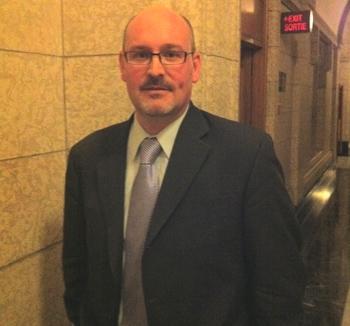During the final hour of debate on Bill C-393, which would reform Canada’s Access to Medicines Regime (CAMR), two critical clauses were restored to the bill as amendments on March 3, while a potential deal-breaking Bloc amendment has been blunted. The final vote was put off to March 9.
The one-licence solution, which was seen as key because it eliminates bureaucratic hurdles in using CAMR, was restored after it had been stripped at committee.
The other restored clause changes the definition of pharmaceutical product in the language. Outstanding is a Bloc motion that would impose a sunset clause on the bill, though during debate, Bloc MPs amended their own amendment to change the sunset from four years to 10.
“I’m delighted,” says NDP MP Paul Dewar, the bill’s new sponsor. “It’s great progress.”
“The bill in its proper, meaningful form will get put to a final vote,” says Richard Elliott, executive director of the Canadian HIV/AIDS Legal Network.
Bloc MP Monique Guay introduced the amended motion, which the Speaker ruled to be in order, during debate.
“Instead of four years, they would have 10 years, so they can really work,” Guay says. “The pharmaceutical industry can really work through that. We have the support of the NDP and the Liberals said yes. But we’ll see when we vote.”
Guay says that they decided to increase the time period from four years to 10 because it was determined that four years wouldn’t be enough time.
“You know how long it takes here,” Guay says. “If we give them a little bit more time, we might have the generic industry really being involved in that, and making sure that medication is being sent there to save the children and the people that need it.”
The sunset clause is still problematic for the other parties, however.
“It’s much better, but I’d still like to think about it,” Dewar says. “It’s so much better than a [four] year sunset, which we couldn’t accept because that would just kill it.”
Liberal MP Raymonde Folco, who spoke strongly in favour of the bill as amended with the one-licence solution restored, is not in favour of the sunset clause.
“There are times in the past where I have voted and I’ve been in favour of sunset clauses,” Folco says, referring to the anti-terrorism bill that was passed following 9/11. “We wanted to put a sunset clause on it because a lot of us were very worried that it went against human rights as we conceive them in Canada. But that isn’t the case here.”
Folco stresses that if the aim of C-393 is to improve the system, then it makes no sense to include a sunset clause to revert CAMR to the old system, which didn’t work for anybody.
“That’s why I’m against the sunset clause in this particular case,” Folco says.
Support for the bill as amended among Liberals has been a key question, given that Liberal industry critic Marc Garneau voted with the Conservatives to strip out the one-licence solution during committee.
Earlier in the week, Liberals put out a statement in support of greater access to medicines, but offered no specifics on the one-license solution.
Folco says that the matter has been discussed in caucus.
“Those who were particularly against it, many of them, possibly all – certainly all of those I spoke to personally – had said that they would rally around accepting the bill with those amendments that passed tonight.”
This is welcome news to Elliott, who has been hearing similar things from Liberals he’s approached, as well as some Conservative MPs who say they will also support the bill.
“That’s very encouraging,” Elliott says. “Obviously they now, like all MPs, need to back up that support by showing up to vote that way next week. That’s critical. We shouldn’t just rest on our laurels here and assume that the work is done.”
The vote on third reading – and the Bloc amendment – will take place on March 9. If it passes, it will be off to the Senate, where Dewar has already arranged for Liberal Senator Sharon Carstairs to sponsor the bill.
“She’s willing and able, and ready to go,” Dewar says.


 Why you can trust Xtra
Why you can trust Xtra


